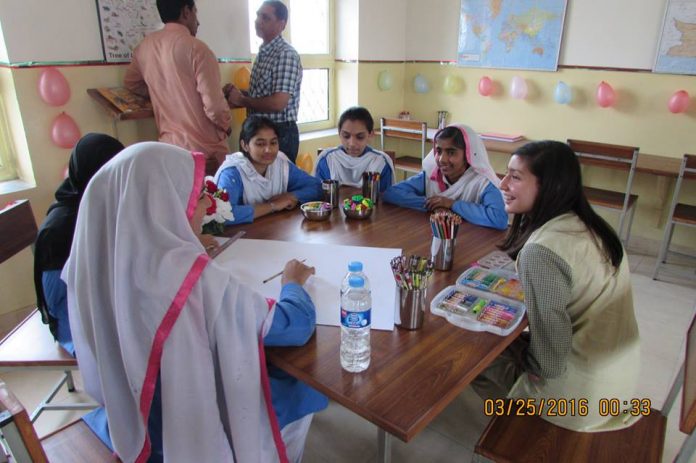Before attending the College of William and Mary, Zoha Siddiqui ’23 had already co-founded a non-profit dedicated to building libraries for girls at underfunded schools. The company has morphed into an impactful resource that reaches tens of thousands of girls in third world countries. HER has opened many doors for Siddiqui since and put her on the path to pursuing law school.
“Through that, I knew that human rights were definitely what I wanted to pursue,” Siddiqui said. “As fulfilling as nonprofit work is, I knew that law was something I was more interested in and feel like I can make a greater contribution to the field of human rights.”
HER began in 2016 with the construction of its first library in a government-sanctioned girls’ school outside of Lahore, Pakistan. Since then, 12 more libraries have been constructed — 11 in Pakistan and one in Morocco.
“It has been amazing to see how much the students enjoy the books that we send over and how they are able to use the space to finally have a safe space to read, study and do art projects,” Siddiqui said.
“It has been amazing to see how much the students enjoy the books that we send over and how they are able to use the space to finally have a safe space to read, study and do art projects,” Siddiqui said.
In order to construct the libraries, HER collects books at schools, libraries and community centers around the United States. The books are sent for free through the U.S. embassy over to Pakistan, and from there, the Women’s Airforce Association delivers the books to the proper locations.
Siddiqui is now working on her own self-designed major in transitional justice and is doing research in various fields. She has published articles in the Monitor, participated in the International Justice Lab at the Global Research Institute and is now working to study declassified government documents.
The Monitor is the College’s journal of international studies. Siddiqui serves as the director of public relations and is a regular contributor with articles that frequently tie into her self-designed major.
“I started taking more classes on transitional justice and am currently an intern through the national security archive, an independent study where a bunch of us can look at declassified government documents related to Cold War military dictatorships in the southern cone,” Siddiqui said. “We are looking for evidence of human rights abuses.”
“I started taking more classes on transitional justice and am currently an intern through the national security archive, an independent study where a bunch of us can look at declassified government documents related to Cold War military dictatorships in the southern cone,” Siddiqui said. “We are looking for evidence of human rights abuses.”
Last year, Siddiqui came across the Sepur Zarco case while in Guatemala for a class. The Sepur Zarco case features mass rape and murder that occurred during the Guatemalan Civil War. This trip focused on how the members of civil society are working to transition the country out of that period of intense violence and to stop the perpetuation of future violence.
“I only heard about it very briefly at one of the events we were attending and then when I got back to the States, I decided to do more research into it,” Siddiqui said.
Upon further investigation, Siddiqui discovered that the case was more groundbreaking than originally recognized.
“It set international and domestic legal precedent, it was the first time a domestic court ever prosecuted a case of domestic slavery, and it was the first time that Guatemala prosecuted sexual violence as a tool of genocide,” Siddiqui said.
Siddiqui has continued her research outside of the class and now participates as a researching member of the IJL. Currently, she is working on a memorialization project. The project consists of a collection of primary and secondary sources which the research has summarized.
When discussing her interest in transitional justice, Siddiqui points to her own privilege.
“Growing up, I had a very privileged life,” Siddiqui said. “My parents are both doctors, I have had an amazing education, both public and private. My parents are both from Pakistan, and some of my family there has not been as lucky as I have. Both of my aunts from my mom’s side were deprived of secondary school education and, at the age of 14, forced out of school and into long hours of earning wages for their brothers to attend private school.”
Siddiqui has looked to members of the College community like history professor Betsy Konefal and Pre-Doctoral Fellow for Academic Diversity in International Relations Kelebogile Zvobgo for insight and guidance. In addition, she has learned from professors at other institutions.
“In terms of other inspirations, there is a professor at George Mason that I have been following, named Jo-Marie Burt, who does a lot of work tracking legal cases in Guatemala,” Siddiqui said. “It’s really cool to be able to be learning from all of these amazing women in the field, and Professor Burt has a lot of really cool work to look at. There are just so many people involved in unique ways, like through the embassies and through research.”
In the future, Siddiqui hopes to continue her work in transitional justice and one day make a career out of it. Outside of the classroom, she enjoys exploring her musical inclination and spending time outside.
“My main thing during quarantine has been going hikes with friends as much as possible,” Siddiqui said. “I live in Arlington, Virginia so there is not much hiking to do here, but I try my best to get out and get a change of scenery.”

